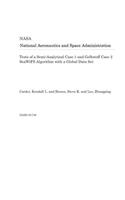
Tests of a Semi-Analytical Case 1 and Gelbstoff Case 2 Seawifs Algorithm with a Global Data Set
Series:
A semi-analytical algorithm was tested with a total of 733 points of either unpackaged or packaged-pigment data, with corresponding algorithm parameters for each data type. The 'unpackaged' type consisted of data sets that were generally consistent with the Case 1 CZCS algorithm and other well calibrated data sets. The 'packaged' type consisted of data sets apparently containing somewhat more pack
NaN
VOLUME
English
Paperback

A semi-analytical algorithm was tested with a total of 733 points of either unpackaged or packaged-pigment data, with corresponding algorithm parameters for each data type. The 'unpackaged' type consisted of data sets that were generally consistent with the Case 1 CZCS algorithm and other well calibrated data sets. The 'packaged' type consisted of data sets apparently containing somewhat more packaged pigments, requiring modification of the absorption parameters of the model consistent with the CalCOFI study area. This resulted in two equally divided data sets. A more thorough scrutiny of these and other data sets using a semianalytical model requires improved knowledge of the phytoplankton and gelbstoff of the specific environment studied. Since the semi-analytical algorithm is dependent upon 4 spectral channels including the 412 nm channel, while most other algorithms are not, a means of testing data sets for consistency was sought. A numerical filter was developed to classify data sets into the above classes. The filter uses reflectance ratios, which can be determined from space. The sensitivity of such numerical filters to measurement resulting from atmospheric correction and sensor noise errors requires further study. The semi-analytical algorithm performed superbly on each of the data sets after classification, resulting in RMS1 errors of 0.107 and 0.121, respectively, for the unpackaged and packaged data-set classes, with little bias and slopes near 1.0. In combination, the RMS1 performance was 0.114. While these numbers appear rather sterling, one must bear in mind what mis-classification does to the results. Using an average or compromise parameterization on the modified global data set yielded an RMS1 error of 0.171, while using the unpackaged parameterization on the global evaluation data set yielded an RMS1 error of 0.284. So, without classification, the algorithm performs better globally using the average parameters than it does using the unpackaged par...
Price Comparison [India]
In This Series
Bestseller Manga
Trending NEWS




















